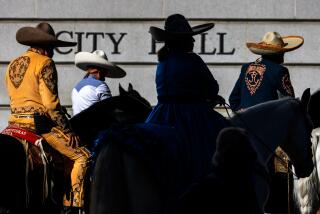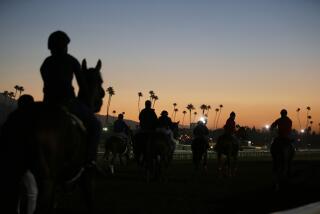Animal welfare groups sue Poway Rodeo alleging use of electric prod on horses
SAN DIEGO — Two animal welfare groups filed a lawsuit Wednesday against the Poway Rodeo, accusing workers at the annual event of illegally shocking tame horses for entertainment purposes.
An Illinois nonprofit called Showing Animals Respect and Kindness, or SHARK, and the Animal Protection and Rescue League, a California nonprofit, filed the complaint in San Diego County Superior Court.
It accuses workers at the three-day event of violating municipal and state laws by electrically shocking tame horses while they are in chutes, or cages, just before they’re released into the rodeo arena with a rider on top.
According to the lawsuit, this causes the horses to buck wildly, “giving these tame, domesticated horses the appearance of being wild, ‘bucking broncos.’”
The next Poway Rodeo is scheduled for Sept. 27-28. The lawsuit seeks a temporary restraining order and an injunction to prevent the rodeo from shocking horses.
In an email Wednesday, Poway Rodeo Chairman Murray Bankhead said the organization does not comment on pending litigation.
Bankhead said Poway Rodeo is sanctioned by the Professional Rodeo Cowboys Assn., or PRCA, the largest and oldest rodeo-sanctioning body in the world. He said the rodeo fully complies with state and city laws.
The Poway Valley Riders Assn., the Salt River Rodeo Co. and the PRCA are also named in the suit. Officials at all three organizations did not respond to messages and calls seeking comment.
According to the complaint, the California Penal Code requires a rodeo to “ensure that no electric prod or similar device is used on any animal once the animal is in the holding chute.” Poway Municipal Code also prohibits the use of electric prods or shocking devices at rodeos and specifically forbids their use on animals being contained in chutes.
As evidence, the lawsuit provided screenshots from a video taken at the rodeo event last year.

The video, which was uploaded to YouTube in January, shows a rodeo worker holding a pronged device near horses in chutes, seconds before they were released into the arena.
The lawsuit said this device is called a “hot-shot.” It emits 5,000 volts of electricity across two metal prongs.
“The manufacturer of the hot-shot, Miller Manufacturing, specifically states on the label that it is never to be used on horses, and has stated in writing that it should never be used in a rodeo setting,” the lawsuit said. “The device is intended for specific situations involving large cows and pigs.”
Bryan Pease, an attorney representing SHARK and APRL, said the incident caught on video was not an isolated event but rather a standard operating procedure for the rodeo.
“It’s common practice,” Pease said. The organizations named in the lawsuit “are known to use that device in other states and jurisdictions where it’s not illegal.”
The professional cowboys association allows the use of prods and similar devices when an animal is in a chute, according to its website, but these devices may be used only when necessary and may touch the animal only on the hip or shoulder area. The sanctioning organization has more than 60 rules to ensure the proper care and treatment of rodeo animals.
According to the lawsuit, SHARK and APRL contacted the San Diego Humane Society about the alleged illegal activity. The organization, which has the jurisdiction to enforce animal cruelty laws, declined to take action, the complaint said.
In a statement Wednesday, Dariel Walker, communications specialist for the Humane Society, said the organization received a video and a complaint about animal cruelty at the rodeo in January. The video was reviewed by humane officers, including a certified equine investigator with three decades of horse handling experience, who concluded that there was no conclusive evidence of abuse.
A second enhanced video, uploaded to YouTube in February, provided additional information that was not available at the time of the first complaint.
“We explained that in any animal cruelty investigation, a complaint has to be timely in order to determine possible violations,” Walker said. “Unfortunately, in this case, we were advised of the alleged incident four months after the occurrence. This hampered our ability to identify the subjects or circumstances of alleged violations.”
The Humane Society regularly attends events where animals are used for entertainment to ensure compliance with local and state laws. Walker said this was the first time the organization has received a complaint about the Poway Rodeo, and staffers are making plans to attend the next event.
Schroeder writes for the San Diego Union-Tribune.
More to Read
Sign up for Essential California
The most important California stories and recommendations in your inbox every morning.
You may occasionally receive promotional content from the Los Angeles Times.











